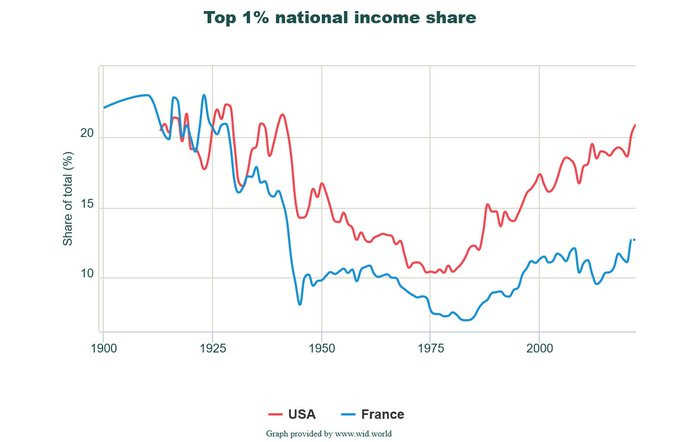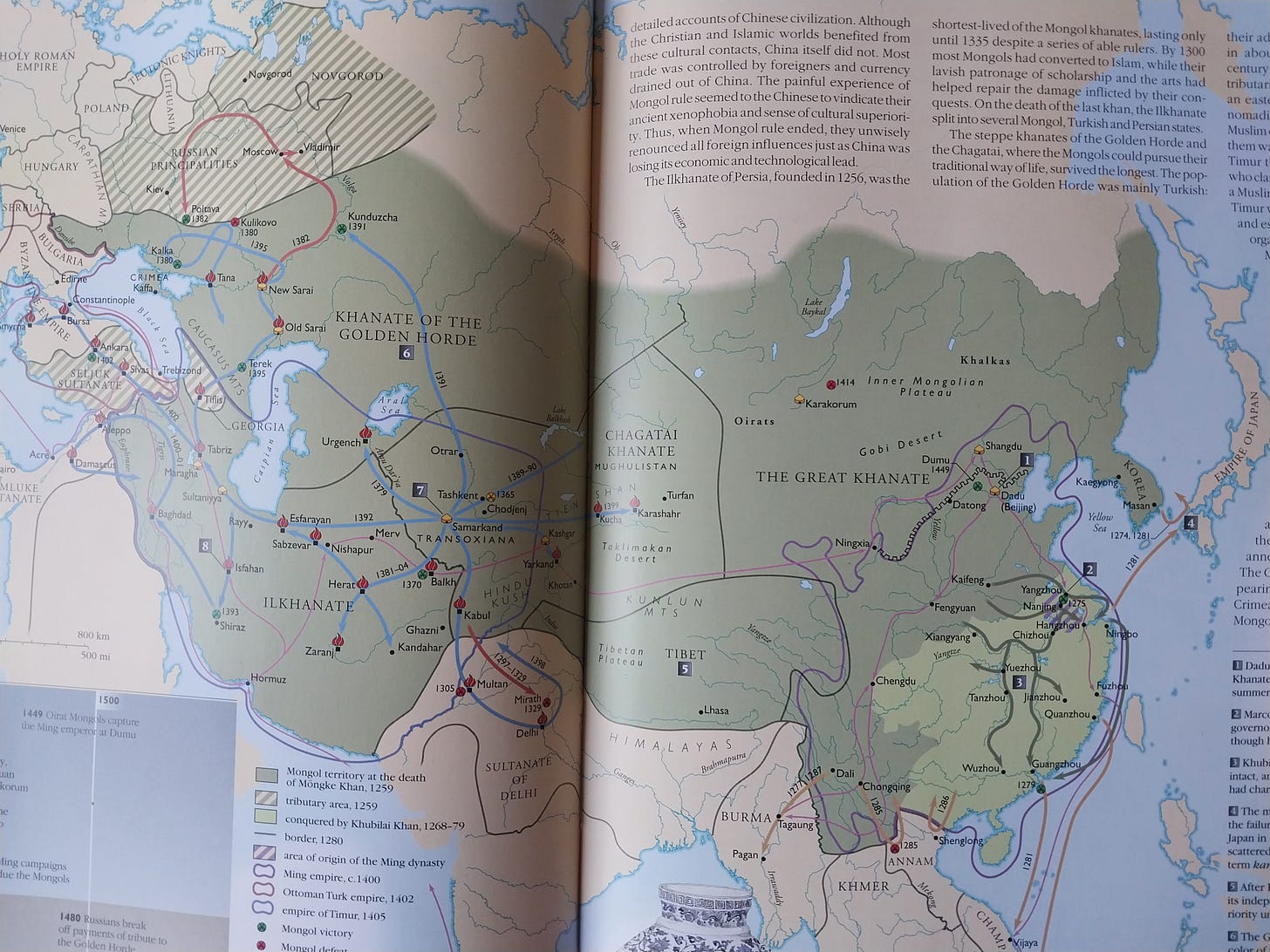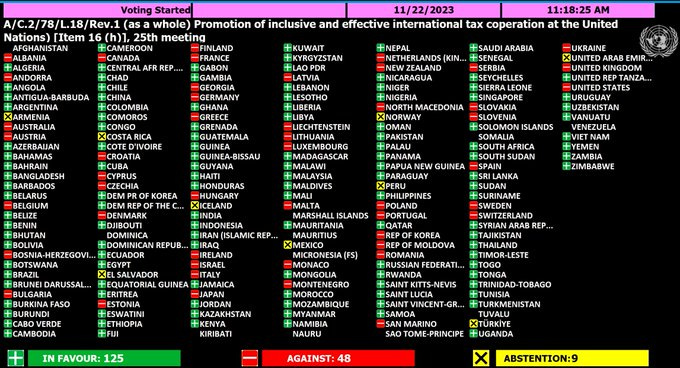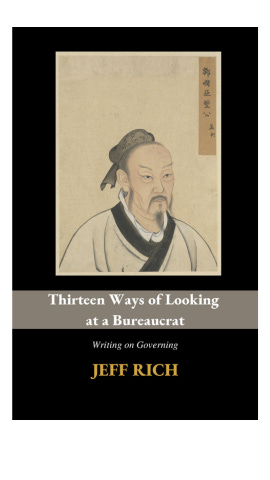How the Mongol Horde Changed the World
🎙️on the influence of the great nomad empires on world history today
Welcome to Fragments of the Burning Archive, my live journal of historical writing to make sense of this time of crisis, war, peace, ruin and fragile hope. This week:
🎙️On the podcast and on YouTube I interviewed Marie Favereau, French historian, on her book, The Horde: How the Mongols Changed the World.
💭My world history view reflects on how Marie Favereau’s history of this neglected nomadic empire suggests a new phase of globalisation has emerged.
➕ Four observations on my big themes - rival empires, fragmented societies, political disorder and cultural renewal - each linked to reflections on Marie’s book, which is the best history book to read on the Mongol Empire and the Golden Horde.
🎙️Interview with Marie Favereau on The Horde
Last week I interviewed, French historian, Marie Favereau on the Mongol Empire, and its successor states, the Hordes (White, Blue and Golden). I am delighted to share this interview with you on both my audio podcast and YouTube channel.
Her book from 2021, The Horde: How the Mongols Changed the World is a readable, scholarly revision of many conventional histories of empire and the West. In these accounts, the Mongols are the barbarian invaders from the East, hungry to plunder the more civilised Europe and Islamic states of West Asia. Marie’s account shows that this old story, which still dominates YouTube history channels and some political rhetoric, is far from the truth.
Her insights begin with the title of the book, The Horde. You may think this uses a pejorative term, unless, like me, you have played one side of World of Warcraft. But, in fact, the negative associations derive from European history’s resentment towards Mongol power and nationalist versions of history, especially in Eastern Europe and Russia. Marie derived the term from the political language of the Mongols. In the interview, Marie told me:
Yeah, that was very important for me to find my own language. Also like which terms I wanted to explain to the public, to the students. … Sometimes it's good to translate, sometimes good to use empire. But when you know that Mongols never used this term for themselves…? Of course, it's also interesting to see what are the terms they want to use in their official documents and that's where I come up with “Horde”, which is term Orda or Ordu... this is the actual term the Mongols used.
(Burning Archive podcast #126, 0:03:28)
It turns out that the image of the Horde and the Mongols dominated by Genghis Khan and marauding archers on horseback is a distortion. The Mongols and the Golden Horde were skilful governors. They embraced diversity. Their states thrived collective decision-making, and societies gave a strong role for women. Their trade, culture, political institutions, communications networks and mastery of the steppe created a phase of globalisation that Marie terms, the Mongol Exchange. It changed the world.
Marie was kind and generous with her time. Do check out the podcast (on Spotify, Apple and other platforms) or YouTube video.
💭Nomads, empires, exchange and globalisation
“The Mongol Exchange.. knit together East and West. Nomads drove global history too, and none more so than the people of the Horde.”
Marie Favereau, The Horde: How the Mongols Changed the World
So many of the standard stories of history, empire and civilisation are dominated by images of stone-built cities, sedentary societies, and cycles of rise and fall. But these tropes do not fit the story of the nomadic empire of the Horde. Nor do they fit other nomadic empires discussed by Marie in the podcast and in her book, such as the Comanche and Apache in North America.
The impact of the Mongols and other peoples of the Horde was different. It is a story of exchange and adaptability. It is a story of the use of both war and peace to service power. And it is a story of globalisation, if before Columbus sailed the ocean blue, and long before America invented the internet.
The central term Marie Favereau used to capture this older story of globalisation, led by a nomadic state, is the Mongol Exchange. From the 1260s, after the first wave of conquests, the descendants of Genghis Khan in the Hordes
balanced power among rivals within the empire, imposed Mongol-style law and order on sedentary subjects with unfamiliar political cultures and ethnic traditions, and fostered a trade network that knit together Central and Eastern Europe, the Mediterranean, Siberia and the Black Sea. This was truly the Mongol exchange; the various participants knew it was the Horde that made the network run, and they courted the khan in hopes of improving their own fortunes. (Favereau, The Horde, pp. 164-165)
The ingenuity of political and cultural institutions was the foundation of this exchange. Its reach across Eurasia and Africa is stunning.
As Marie Favereau wrote:
Through its singular adaptiveness and assimilative capacities, the Horde changed the world. The Horde shaped the politics of Russia and Central Asia, and firmly anchored Islam in the Caucasus and Eastern Europe. The Horde brought the steppe peoples to Mamluk Egypt and Franciscans to Crimea and the lower Volga. (The Horde, p. 308)
Towards the end of the podcast, we discussed globalisation, and how it did not start in the 1990s, or after 1945, or 1815 or 1492. There have been many phases and styles of globalisation in the course of history. The nomad led Mongol exchange was one, and thinking about these different stories can help us imagine today’s world more clearly.
I wonder whether we are not entering a new phase of globalisation, one the West and the Rest will experience a new, more balanced exchange. American financialised globalisation, cultural homogenisation and political universalism appears to be coming to an end. New great states of Eurasian, Africa and Central-South America display greater adaptiveness and assimilative capacities. They also embrace more diversity in civilizations, rather than just celebrating the rise and rise of the Atlantic West.
❓ I speculated on this theme in my paid-subscriber only article, The Era of non-Western Globalisation has Begun. Let me know what you think.
➕ Four observations of the multipolar world
Each week I study our changing multipolar world, and look for surprises and signs of how history is unfolding in four dimensions: rival empires, fragmented societies, political disorder and cultural renewal. This week I am introducing some stylistic changes (do you like the emojis?) and trying to keep these glimpses briefer.
🐎Rival Empires - the legacy of nomadic empires in Eurasia
Coincidentally during the week UNESCO announced a new initiative on the “History of Nomadic Civilizations.” This proposal came from Mongolia, and was approved at the 42nd session of the UNESCO General Conference in November.
This project will provide deeper understanding of nomadic cultures and civilizations and, their contributions to human history. Spot on with Marie Favereau’s work!
The project will produce six volumes with the first volume to be “Nomads in Mongolian Steppe: Cradle of Nomadic Empires”.
It is interesting to note which countries wanted to participate: Norway, Kenya, Hungary, China, India, Russia, Thailand, Uganda, and Azerbaijan. The countries that supported and co-authored the draft resolution were: Afghanistan, Republic of Korea, Kazakhstan, France, and Russia. Perhaps, Marie Favereau has had some impact on French diplomats. Regrettably, Australia appears to have been silent, despite its own nomadic pasts.
🤼Political Disorder - International taxation and political disorder
At the United Nations, the General Assembly voted to begin negotiations on a legally binding UN tax convention, in a move celebrated by some advocates as one for the history books. The primary action of the resolution was:
Emphasizes that developing a United Nations framework convention on international tax cooperation is needed in order to strengthen international tax cooperation and make it fully inclusive and more effective
‘Starving the beast’ of government by depriving states of secure taxation has been a power play of market-obsessed politicians and tax-minimising corporations for decades. It has had drastic consequences, with many oligarchs and corporations living in a tax-free world, while governments struggle with revenue. It has had a dramatic impact on the core imperial state, the USA. Economic historian Adam Tooze notes that the great problem of finance in the USA is not expenditure, but the low share of economic activity that flows to public taxation.
Taxation is one of those dull but central tasks of political order. It was handled skilfully by the Horde. It has not been managed so well by Western liberal democracies over the last 40 years.
A group of eminent economists including Joseph Stiglitz signed an open letter that supported the proposed taxation convention, initially proposed by a group of African countries. They wrote:
The question to be decided this week is what rich economies like the United States and the European Union will do. If they oppose a binding UN framework convention (as they have signalled they will do), they will be sending a message that they prefer the current ineffective and unfair arrangements to the possibility of reforms that would benefit their own people by stemming the revenue losses their governments currently suffer.
Leading economist and historian of inequality, Thomas Piketty, celebrated the UN vote. However, the convention was fiercely opposed by that lagging indicator of economic thought, the OECD. Australian readers may recall the Secretary-General of the OECD: Mattias Corman, the former cigar-smoking, expenditure-slashing Finance Minister in the early years of the Abbott/Turnbull Governments.
Australian readers who do not sympathise with Mr Corman’s political views, however, may be disappointed to learn that the no longer fresh Labor Government was happy to back the OECD, the USA, international corporations and Mr Corman in opposing the UN convention. Australia chose to slouch in the dustbin of history, rather than write its name proudly in the history books of fair taxation.
🥀Social Fragmentation - Inequality and Collective Decision Making
On Twitter/X Thomas Piketty shared a graph from the World Inequality Database on the national income share of the top 1% in France and the USA from 1900 to 2022.

The USA graph on inequality is stunning. That indispensable nation has reverted to the Gilded Age level of inequality after 40+ years of market-liberal or neo-liberal government. From Reagan to Biden, the USA leadership has reversed the gains of the democratic age of the mid-20th century. Perhaps they need to learn something from other political cultures of the multipolar world?
🌾 Cultural Renewal - Civilisational Diversity Finding its Voice?
I have written before here how the BRICS aligned states espouse a new vision of a world expanding with civilizational diversity, rather than flattening out in one Western vision. These are not just visions of leaders, but express the irrepressibly dynamism of culture across the world. The shell of Western identity has cracked and new voices are emerging from the ruin. In St Petersburg a United Cultures cultural conference was held, at which Vladimir Putin spoke and answered questions on what civilisational diversity and culture. He spoke directly to the theme of civilisational diversity (which I commented on in The Price of Great Historical Transformations)
A country-civilisation, Russia has carefully kept the languages and traditions of all peoples living in it and is a unique unity of a multitude of distinctive cultures.
The experience of the millennium-old history of our country convincingly shows that cultural diversity is the greatest blessing while the interaction of cultures is one of the conditions for stable and peaceful development. After all, some of the main reasons for today’s international tensions are rooted in the claims of some forces to exclusivity, including cultural exclusivity, their disregard for the customs and spiritual values of others, a striving to subject everyone and everything to unification under their own pattern that they consider the best and most universal. This distasteful globalisation and, let me add, cultural expansionism, have led to cultural suppression and deprivation and have multiplied the potential for conflict.
We are convinced that the future belongs to free, multilinear, and diverse cultures, the broadest possible dialogue of humanitarian communities in the multipolar world that is forming today.
The speech was delivered in the Hermitage Museum, where, Marie Favereau reminded me, many of the cultural treasures of the Horde are stored. Could it be that Russia, whose statehood and traditions were constructively formed by the Horde, will help the world move away from Netflix globalisation to embrace a true multitude of distinctive cultures?
3🌏stories to watch over the next 3 months
Taiwan
The Taiwanese election is scheduled for 13 January 2024. There is a prospect that the current ruling, pro-independence party will lose. The opposition coalition of parties may enter dialogue with China on reunification. If that happens, the geopolitical year will not begin well for the US empire.
Ruin in Ukraine
The situation in Ukraine keeps getting worse with Russian military advances across the front during the season of rain and mud. These attacks are the real counter-offensive.
There was an excellent account of the war from Australian academic Graeme Gill during the week. Some shrill ideologues in Professor Gill’s audience nonetheless sought to intimidate him with claims that he “advocating for the genocide of Ukranians.”
The intimidation did not work. Regrettably, while more people are waking up to the catastrophic failure and moral depravity of policies in Ukraine, the calls to keep it going for as long as it takes continue. Western leaders and security-adjacent academics who insist Ukraine keeps fighting, keeps conscripting more and more people, and keeps ruining itself for the sake of the US and its allies.
The question is will Ukraine be ruined and its government collapse this winter? Winter has come, as I wrote recently in The Ruin of Ukraine.
Australia at the UN
The Israel-Gaza crisis has highlighted the United Nations can be an effective forum for international dialogue and diplomacy. It has shone a light on some of the scandalous positions advocated by some Western and other powers.
Sadly, Australia is among them. Australia has pulled some shockers recently in its votes at the United Nations. It failed to condemn promotion of Nazi ideology, and this week it failed to support a fair international tax convention.
I might start a regular segment here bringing attention to the Australian voting record at the United Nations. Perhaps we should learn something from the diplomacy of the Horde.
❓ What big stories will emerge over the next 3 months?
Let me know what you think, and would like me to write about.
How you can delve deeper?
Check out all my content, books, articles, courses, podcast backlist and videos, at my renovated Substack homepage and at www.theburningarchive.com. You can buy my books at Amazon and other retailers.
🙏 A big thank you to everyone who supports my writing, talks and research here.
I am planning some new ways to build the discussion here and on my other channels. I want to offer more ways to engage with you over the best historical insights to help us all live more peacefully through these times of crisis. Feel free to throw comments in chat here, on YouTube, on the podcast or on twitter/X.
Three great ways to support me are:
🙏Take out a paid subscription here on Substack
❤️Follow and like me on all channels.
🔗Share my work with your network.
Why not share this post right now?
See you next week






